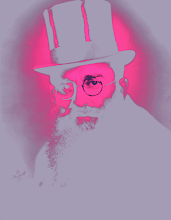 I completely missed the anniversary. Earlier this month, 40 years ago Frank Zappa summoned the Captain and his Magic Band to his home studio for a preview of their assembled album. Dressed in Sunday best (after all, it was Easter) intently they listened. The Captain was overjoyed, the Band relived. Perhaps now they would be free of his artistic and physical cruelty. A year of living in absolute poverty and under near cult like circumstances had payed off. Little could they imagine that in the years to come, in reverent awe, people would still speak of this work.
I completely missed the anniversary. Earlier this month, 40 years ago Frank Zappa summoned the Captain and his Magic Band to his home studio for a preview of their assembled album. Dressed in Sunday best (after all, it was Easter) intently they listened. The Captain was overjoyed, the Band relived. Perhaps now they would be free of his artistic and physical cruelty. A year of living in absolute poverty and under near cult like circumstances had payed off. Little could they imagine that in the years to come, in reverent awe, people would still speak of this work.For as wild as free jazz was, and that by 1968/1969 it was perfectly OK to sit and play your bongos in the dirt, nothing sounded like this. Keeping to the credo of mutations, with their awkwardly placed limbs causing a shambling gate, causing fear and revulsion to all they encounter, the music has the same frightening assault on the senses. To the untrained ear the music sounds wrong. Clashing time signatures - every instrument sounds in conflict. The Captains wounded animal howling vocals laying lyrics that are products of schizophrenia yet are deeply insightful. Ironically they seem to be concerned about how mean humans can be to each other. This is just too much for dull minds...
There have been scores of musicians that have attempted to incorporate the Magic Band sound, but it just hasn't worked. What makes the playing here so unique is the amount of control that is cleverly disguised. To the untrained, this just seems like a sonic free for all. If it was it just wouldn't have worked.
 Little hints of regular rhythm here and there, but the melding of free jazz and delta blues seems to obscure anything below the surface. But if you stick with it you'll get it, just throw out the preconceived notion of what comprises a song. This is the sound of nature. Anima does not compose straight lines, and that rule applies here. A melody may only need to play 7 bars even though the song is 24 long, but it works. Any more and there would be excess, and in reflection of the times when album tracks were getting longer and longer the songs are economical. Can you imagine any other band getting 28 pieces on a double album?
Little hints of regular rhythm here and there, but the melding of free jazz and delta blues seems to obscure anything below the surface. But if you stick with it you'll get it, just throw out the preconceived notion of what comprises a song. This is the sound of nature. Anima does not compose straight lines, and that rule applies here. A melody may only need to play 7 bars even though the song is 24 long, but it works. Any more and there would be excess, and in reflection of the times when album tracks were getting longer and longer the songs are economical. Can you imagine any other band getting 28 pieces on a double album?1969 was the watershed year for 60's wretchedness - Woodstock, the accession of the Grateful Dead come readily to mind, but thankfully we have from that year an album that transcended music and became art.
Please click on the review title for the track: Hair Pie I / untitled / dialog / Hobo Chang Ba. These were taped at the Trout Mask House when the album was to be recorded there as a "Ethnic Field Recording". While they lack Vliet's vocals, his absence shows how complex and almost Rites Of Spring like the music is.




No comments:
Post a Comment